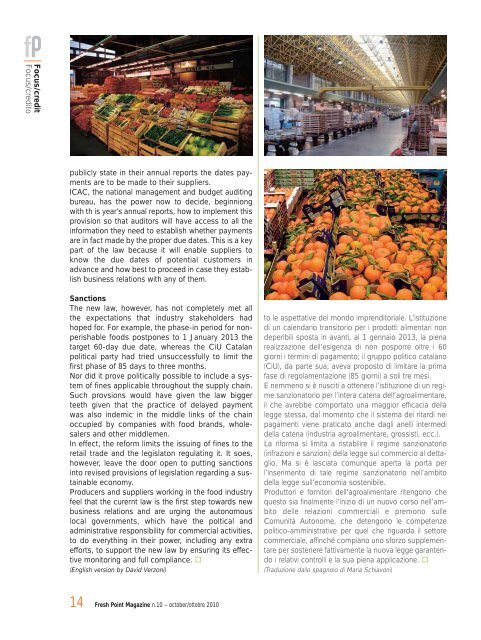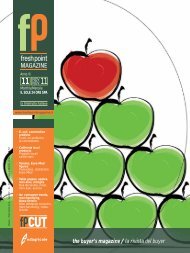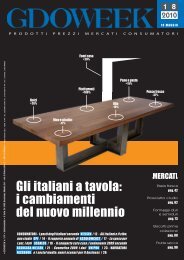Fresh Point Magazine - B2B24 - Il Sole 24 Ore
Fresh Point Magazine - B2B24 - Il Sole 24 Ore
Fresh Point Magazine - B2B24 - Il Sole 24 Ore
You also want an ePaper? Increase the reach of your titles
YUMPU automatically turns print PDFs into web optimized ePapers that Google loves.
Focus/credit<br />
Focus/credito<br />
publicly state in their annual reports the dates payments<br />
are to be made to their suppliers.<br />
ICAC, the national management and budget auditing<br />
bureau, has the power now to decide, beginniong<br />
with th is year’s annual reports, how to implement this<br />
provision so that auditors will have access to all the<br />
information they need to establish whether payments<br />
are in fact made by the proper due dates. This is a key<br />
part of the law because it will enable suppliers to<br />
know the due dates of potential customers in<br />
advance and how best to proceed in case they establish<br />
business relations with any of them.<br />
Sanctions<br />
The new law, however, has not completely met all<br />
the expectations that industry stakeholders had<br />
hoped for. For example, the phase-in period for nonperishable<br />
foods postpones to 1 January 2013 the<br />
target 60-day due date, whereas the CiU Catalan<br />
political party had tried unsuccessfully to limit the<br />
first phase of 85 days to three months.<br />
Nor did it prove politically possible to include a system<br />
of fines applicable throughout the supply chain.<br />
Such provsions would have given the law bigger<br />
teeth given that the practice of delayed payment<br />
was also indemic in the middle links of the chain<br />
occupied by companies with food brands, wholesalers<br />
and other middlemen.<br />
In effect, the reform limits the issuing of fines to the<br />
retail trade and the legislaton regulating it. It soes,<br />
however, leave the door open to putting sanctions<br />
into revised provisions of legislation regarding a sustainable<br />
economy.<br />
Producers and suppliers working in the food industry<br />
feel that the curernt law is the first step towards new<br />
business relations and are urging the autonomous<br />
local governments, which have the poltical and<br />
administrative responsibility for commercial activities,<br />
to do everything in their power, including any extra<br />
efforts, to support the new law by ensuring its effective<br />
monitoring and full compliance.<br />
(English version by David Verzoni)<br />
14 <strong>Fresh</strong> <strong>Point</strong> <strong>Magazine</strong> n.10 – october/ottobre 2010<br />
to le aspettative del mondo imprenditoriale. L’istituzione<br />
di un calendario transitorio per i prodotti alimentari non<br />
deperibili sposta in avanti, al 1 gennaio 2013, la piena<br />
realizzazione dell’esigenza di non posporre oltre i 60<br />
giorni i termini di pagamento; il gruppo politico catalano<br />
(CiU), da parte sua, aveva proposto di limitare la prima<br />
fase di regolamentazione (85 giorni) a soli tre mesi.<br />
E nemmeno si è riusciti a ottenere l’istituzione di un regime<br />
sanzionatorio per l’intera catena dell’agroalimentare,<br />
il che avrebbe comportato una maggior efficacia della<br />
legge stessa, dal momento che il sistema dei ritardi nei<br />
pagamenti viene praticato anche dagli anelli intermedi<br />
della catena (industria agroalimentare, grossisti, ecc.).<br />
La riforma si limita a ristabilire il regime sanzionatorio<br />
(infrazioni e sanzioni) della legge sul commercio al dettaglio.<br />
Ma si è lasciata comunque aperta la porta per<br />
l’inserimento di tale regime sanzionatorio nell’ambito<br />
della legge sull’economia sostenibile.<br />
Produttori e fornitori dell’agroalimentare ritengono che<br />
questo sia finalmente l’inizio di un nuovo corso nell’ambito<br />
delle relazioni commerciali e premono sulle<br />
Comunità Autonome, che detengono le competenze<br />
politico-amministrative per quel che riguarda il settore<br />
commerciale, affinché compiano uno sforzo supplementare<br />
per sostenere fattivamente la nuova legge garantendo<br />
i relativi controlli e la sua piena applicazione.<br />
(Traduzione dallo spagnolo di Maria Schiavoni)
















